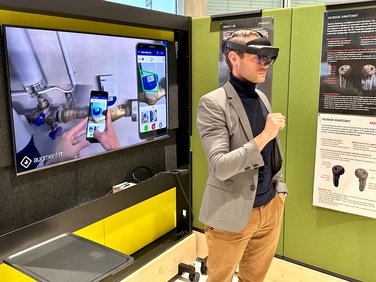Research - 03.05.2022 - 00:00
UZH and HSG create two joint bridge professorships on digitalization in medicine
The University of St.Gallen and the University of Zurich are creating two chairs as part of the joint training of medical students - the Joint Medical Master. Tobias Kowatsch will be Professor for "Digital Health Interventions" and Janna Hastings Professor for "Medical Knowledge and Decision Support". Harnessing the opportunities of digitalization in medicine is the focus for both bridge professorships.

3 May 2022. The University of St.Gallen (HSG) and the University of Zurich (UZH) have been offering a Joint Medical Master (JMM-HSG/UZH) for 40 medical students annually since 2020. The aim is that more prospective doctors from eastern Switzerland will also settle there after graduation in order to counteract the shortage of doctors in the region. Students complete the bachelor's program at UZH and transfer to St.Gallen for the master's program. Clinical teaching takes place in the St.Gallen/Eastern Switzerland region throughout the course of study.
Janna Hastings and Tobias Kowatsch fill new chairs
As part of the Joint Medical Masters, the two universities have now created two bridge professorships: Prof. Dr. Janna Hastings becomes assistant professor with tenure track for "Medical Knowledge and Decision Support" and Prof. Dr. Tobias Kowatsch takes over the chair for "Digital Health Interventions". The two specialists were appointed to the Medical Faculty of the UZH - specifically to the newly founded Institute for Implementation Science in Health Care. Funding, on the other hand, is provided by the HSG, where their primary place of work is also located.
"The newly created professorships bridge the gap between the Universities of St.Gallen and Zurich in two ways: they expand the spectrum of teaching and research into topics that are essential for the future of medical education and health care. In addition, the boundaries between the institutions become much more permeable, which strengthens the research landscape," says Alexander Geissler, Academic Director of the School of Medicine at the HSG.
Making digitization more useful for patients and physicians
Janna Hastings is an expert in healthcare information technology and biomedical informatics. Since 2020, she has worked as a "Systems Specialist" at the Bioinformatics Competence Centre and Laboratory for Molecular Neurobiology at EPFL in Lausanne. Tobias Kowatsch is a business informatics specialist and has been scientific director at the Center for Digital Health Interventions at ETH Zurich and HSG since 2013. "Digitalization has an enormous impact on medicine. With the two bridge professorships, we are creating a basis for making the opportunities of digitalization more accessible to patients and physicians," says Hanns Ulrich Zeilhofer, Deputy Dean of the UZH Faculty of Medicine.
Medical Knowledge and Decision Support
The professorship for "Medical Knowledge and Decision Support" is concerned with how access to medical information will change for doctors in the future. Whereas in the past a large part of the expertise consisted of the learned, retrievable knowledge of the physician, in the future factual knowledge will be made available more and more via expert systems. How should the medical profession deal with specialized knowledge? What skills and interfaces are needed for this? And how will this change affect education and training? Such questions are at the heart of Janna Hastings' research - in short, knowledge and skills management along the lifelong learning pathway in medicine.
Digital Health Interventions
The chair "Digital Health Interventions" is dedicated to the digital networking of the doctor-patient relationship and the support of multimorbid patients. These people suffer from one, often even several chronic diseases. Their care is correspondingly complex - both medically and organizationally - across specialist disciplines, professional groups and distances. The use of digital media makes it possible to accompany patients more directly with analysis instruments such as wearable electronics or to encourage them to change their behavior with mobile coaches. Physicians, in turn, can use the data for diagnosis and therapy. Together with clinicians, computer scientists and behavioral scientists, Tobias Kowatsch will develop, research and communicate a variety of applications of modern digital solutions.
Image: Fotolia / Witthaya
More articles from the same category
This could also be of interest to you
Discover our special topics
















